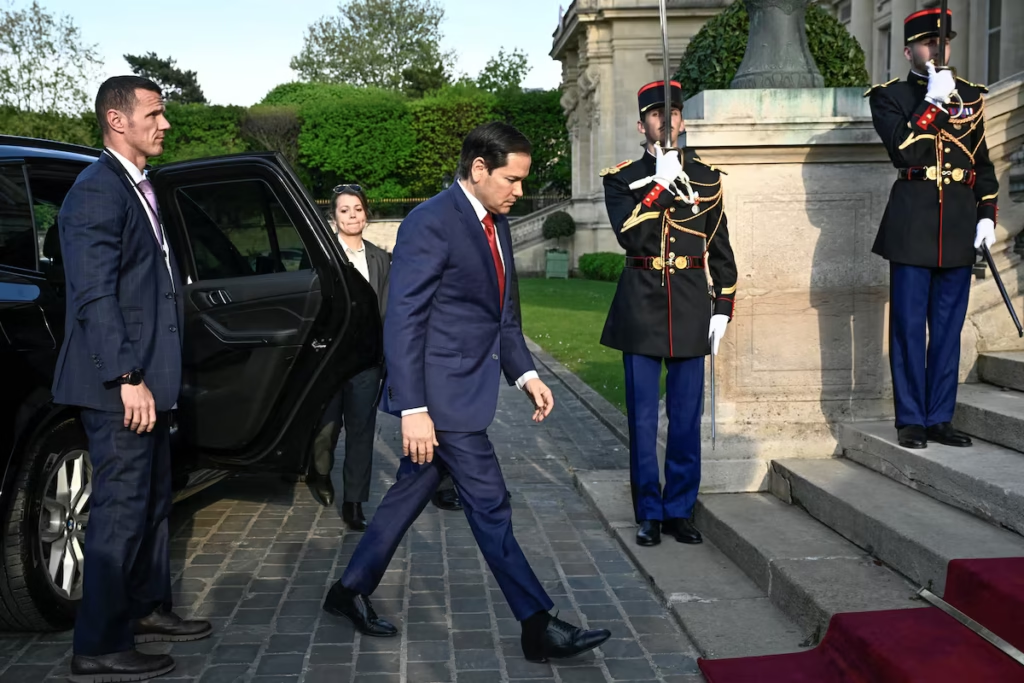The United States is poised to withdraw from its push to broker peace between Russia and Ukraine unless there is immediate and tangible progress, President Donald Trump and Secretary of State Marco Rubio signaled Friday. Their statements reflect rising frustration in Washington over stalled negotiations and the growing belief that diplomatic momentum is fading fast.

Speaking from the White House, Trump made clear that while he remains committed to ending the war, patience is wearing thin. “Quickly, we want to get it done,” he told reporters. “If one of the parties makes it very difficult, we’re going to say, ‘You’re foolish, you’re fools, you’re horrible people,’ and we’re going to just take a pass. But hopefully we won’t have to do that.”
Rubio echoed this urgency during remarks in Paris following high-level talks with European and Ukrainian leaders, emphasizing that Washington will not allow negotiations to drag on indefinitely. “We’re not going to continue with this endeavour for weeks and months on end,” he said. “We need to determine very quickly—within days—whether or not this is doable in the next few weeks. If it’s not, I think the president is at a point where he’s going to say, ‘We’re done.’”
While Trump declined to name a firm deadline, he reinforced Rubio’s stance. “Marco’s right… we want to see it end,” Trump said. When asked whether Russian President Vladimir Putin was intentionally delaying peace, Trump replied, “I hope not.”
According to multiple diplomatic sources, White House frustration has been mounting over what officials perceive as Russia’s reluctance to negotiate in good faith. Recent attempts to reignite talks—including high-level discussions in Saudi Arabia and now in Paris—have produced only limited outcomes, such as partial ceasefires, without resolving broader territorial and political disputes.
Kremlin spokesman Dmitry Peskov acknowledged “some progress” had been made, but noted that discussions with Washington remained “difficult.” He reiterated that Moscow remained open to dialogue but insisted Russia’s national interests must be preserved in any resolution.
The most recent Paris meeting marked the first in-person talks involving the US, Ukraine, and key European powers under the Trump administration’s peace initiative. Rubio said the US proposal for a ceasefire and roadmap toward broader peace received an “encouraging reception.” Ukrainian President Volodymyr Zelenskiy’s office described the discussions as “constructive and positive.”
Vice President JD Vance, speaking from Rome after meetings with Italian Prime Minister Giorgia Meloni, said he remained “optimistic” that the US could help end the war, which he called a “very brutal conflict.” A US official confirmed that the next round of talks is scheduled to take place in London next week, with hopes that Ukraine will agree to a preliminary “term sheet” including a 30-day comprehensive ceasefire over land, sea, and air.
Trump initially promised during his campaign to end the Ukraine war within 24 hours of taking office. After assuming the presidency, he extended that timeline, aiming for a peace agreement by April or May. As military and political complications mounted, however, that ambition has met significant resistance.
The president has applied pressure on both Kyiv and Moscow to return to the negotiating table—threatening tighter sanctions on Russia while also warning of a potential end to the flow of US military aid to Ukraine if talks continue to stall.
Despite earlier hopes raised by the US-led meeting in Saudi Arabia, the outcome has been limited. The conflict rages on, punctuated by continued violence, including a deadly missile strike on Sumy in northeastern Ukraine that killed 35 civilians—an incident Trump called “a mistake.”
A source familiar with internal White House deliberations said Trump has begun to question whether remaining in the peace process is worthwhile, given the lack of traction and the risk of the conflict becoming “Trump’s war.” Rubio’s statements, the source added, were designed to publicly reflect Trump’s growing impatience.
Should the US withdraw from its role in negotiations, the peace process could falter altogether. With no other global power capable of exerting similar leverage over both Moscow and Kyiv, Washington’s exit would leave a dangerous vacuum.
Still, what follows remains unclear. The US could choose to maintain its current posture—enforcing sanctions on Russia and continuing aid to Ukraine—or pivot more drastically, cutting off military support and reshaping its entire Ukraine strategy.
In a separate development, Trump mentioned plans to sign a mineral rights deal with Ukraine next week—reviving a proposal that collapsed in February following tensions between Zelenskiy, Vice President Vance, and other Republican leaders.
Meanwhile, Rubio confirmed that he spoke directly with Russian Foreign Minister Sergei Lavrov following the Paris talks to brief him on the US peace framework. However, significant divides remain.
Putin has demanded that Ukraine relinquish its bid for NATO membership, formally cede four contested regions to Russia, and drastically reduce the size of its military—terms that Kyiv considers unacceptable and tantamount to surrender.
Rubio acknowledged that European nations would play a key role in any final agreement, particularly when it comes to lifting sanctions on Russia as part of a settlement. Discussions also touched on potential US security guarantees, which he said could be addressed in ways “acceptable to everyone.” But he warned that these were secondary to more urgent obstacles facing the peace effort.
As the clock ticks, the White House is sending a clear message: without rapid and meaningful progress, the US is prepared to walk away from the negotiating table—leaving the fate of the Russia-Ukraine conflict in even deeper uncertainty.



